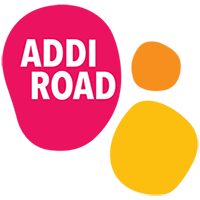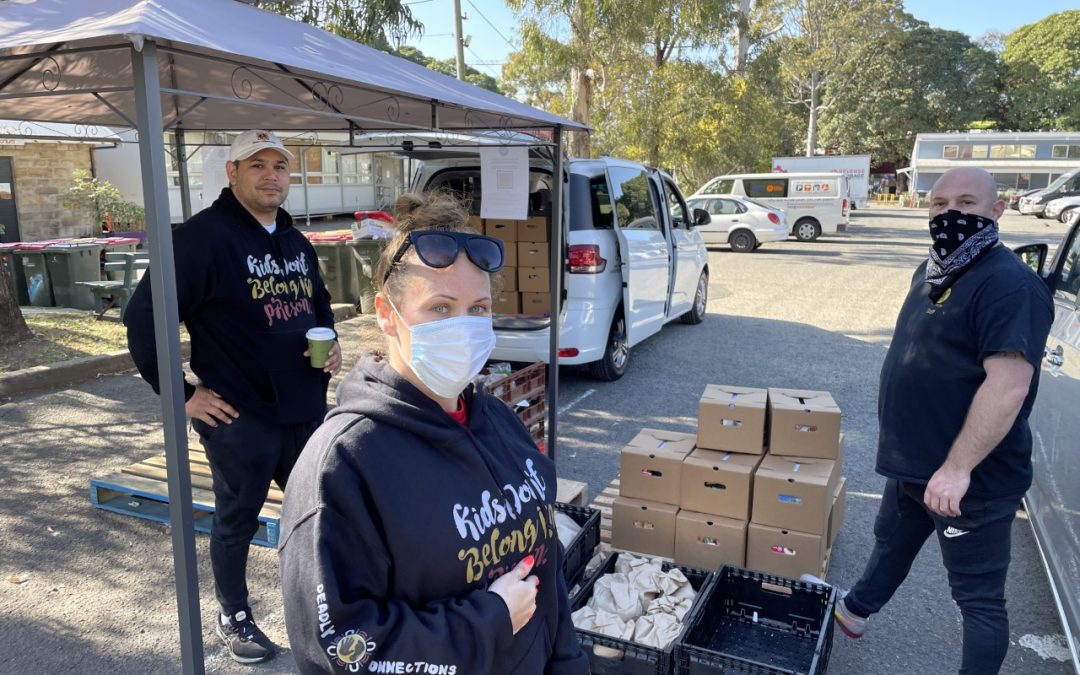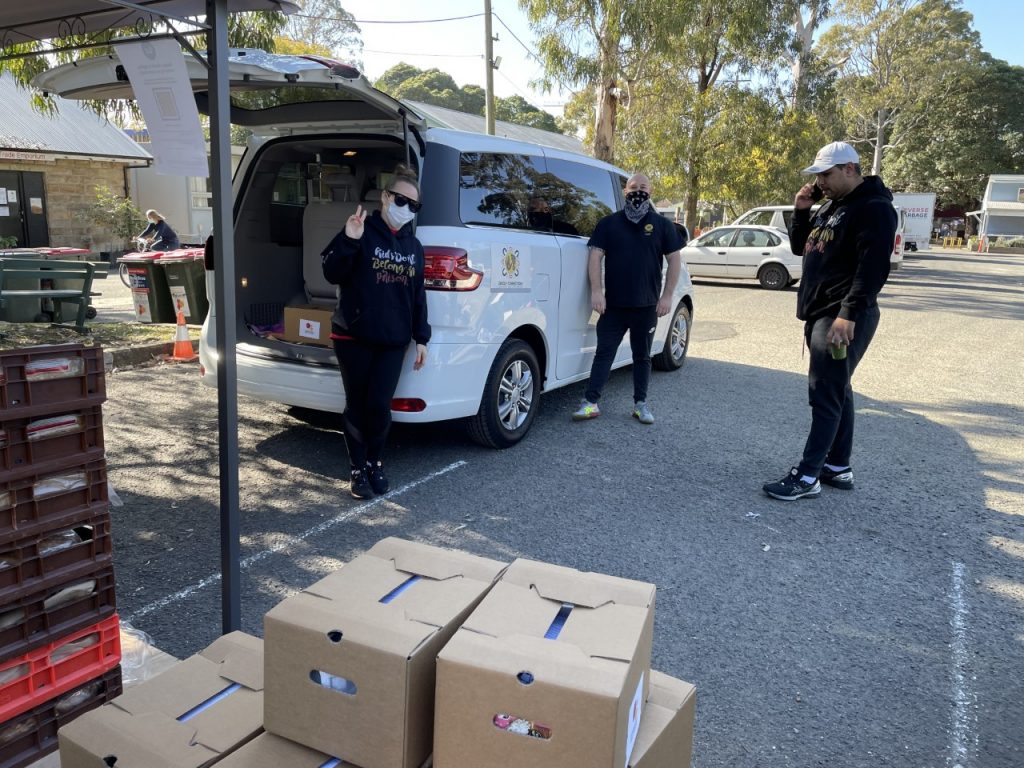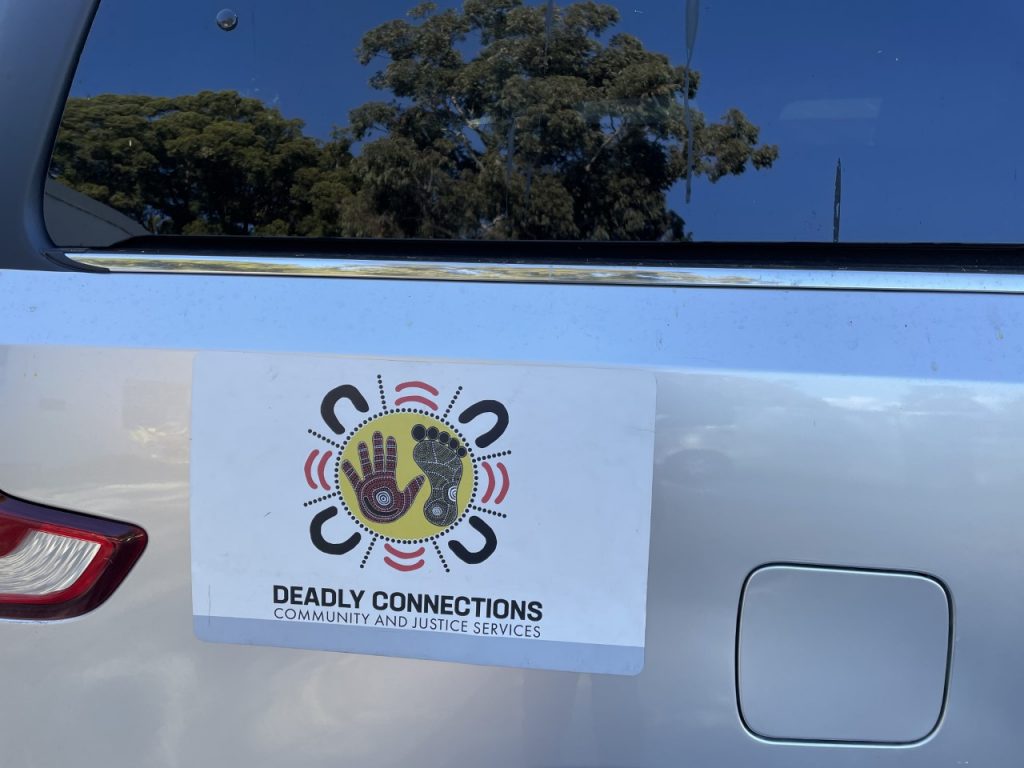Keenan Mundine, Carly Stanley and Dean Lloyd are here from Deadly Connections, picking up hamper boxes from Addi Road’s Emergency Food Relief Hub. They’re using two vans to do a big delivery run to Glebe, Waterloo, Redfern, Marrickville and Dulwich Hill.
Deadly Connections work across those areas and throughout the Inner West with the local Aboriginal community, particularly those impacted by child protection and the law. Their aim is to break through the intergenerational cycles of trauma, loss and disadvantage, and support people to create a new path for themselves and their families.
They could use more hands on deck, they reckon, to help with their food deliveries. Right now, they’re doing everything as best as they can. Carly is the CEO and Founder of Deadly Connections, Keenan the Co-Founder and Ambassador, Dean their Criminal Justice Specialist. Back at the office they have two more staff. Everybody pitches in.
When Rosanna Barbero, CEO for Addi Road, hears Carly talking, she steps over to discuss how Addi Road can help Deadly Connections take some weight off themselves and make use of Addi Road’s volunteer network of drivers. A lot of good things happen this way every day here, right at the edge of where community organisations and civil society groups are working together to feed the city. It’s really the only way any immediate action can kick into gear and be meaningful.
Despite the pressure on Deadly Connections as a small organisation, Carly says she likes being out there doing the deliveries. “I do get a big cagey with the lockdown. And it’s good to see more of people and what is going on.”
“We are just too busy, though,” Keenan says, in a half-worried, half-happy way that indicates he is likewise glad they are connecting with their community. Today is a special day, he notes, as it is “a chance to touch base with people that have not had any food deliveries before. More and more people are reaching out to us.”
“The feedback we are getting every day, nothing can describe it. People are at home and feeling very vulnerable. There is no one that they feel they can speak to and trust but us.”
“If we don’t do this, man, who will? Who will provide the hope?
So we do it.”
Dean listens to all that Carly and Keenan say and adds that it gets more complicated because many families and homes are suffering from overcrowding and corresponding over-policing issues. There’s a lot of pressure inside the house; and a lot of pressure outside on the streets.
He also explains that “food shortages and economic difficulties are not just a COVID-19 lockdown thing for us and our communities. It was there before for Aboriginal people – and it will be there after all this is over, even more so. So it’s what happens after the lockdowns and food relief efforts fall away that we worry about. What’s coming next? We really hope we can keep coming here and working with you because we will need it.”
Keenan maintains the optimistic balance as all three turn from the boxed hampers stacked in their two vans to loading up pallets of bread on top. They’re doubly pleased people in their community are asking for fruit and vegetables that they can now supply to keep everyone at home, happy and healthy.
“We just love our partnership with Addi Road,” Keenan says. “You can shine that up any way you like for a media release because it’s the truth.”
On a practical level, he explains that because Addi Road has been supplying Deadly Connections with food hampers, it has freed them up to do more in other ways for the Aboriginal community. “We were spending our money on food relief to keep families going. Now we can keep that money and use it to reach even more people.”
As for any pressure he, Carly and Dean might be feeling day-to-day themselves, Keenan breaks into that worried-happy laugh of his again. “If we don’t do this, man, who will? Who will provide the hope? So we do it. It’s crucial … the food, the conversations we have, and human connection we bring.”
“The trick is not to show you are tired,” Keenan says, bearing himself up even taller than before. “We have to be the change we want to see. And give people the hope I’m talking about. It’s about more than the food; it’s about the energy they see in us when we arrive.”



